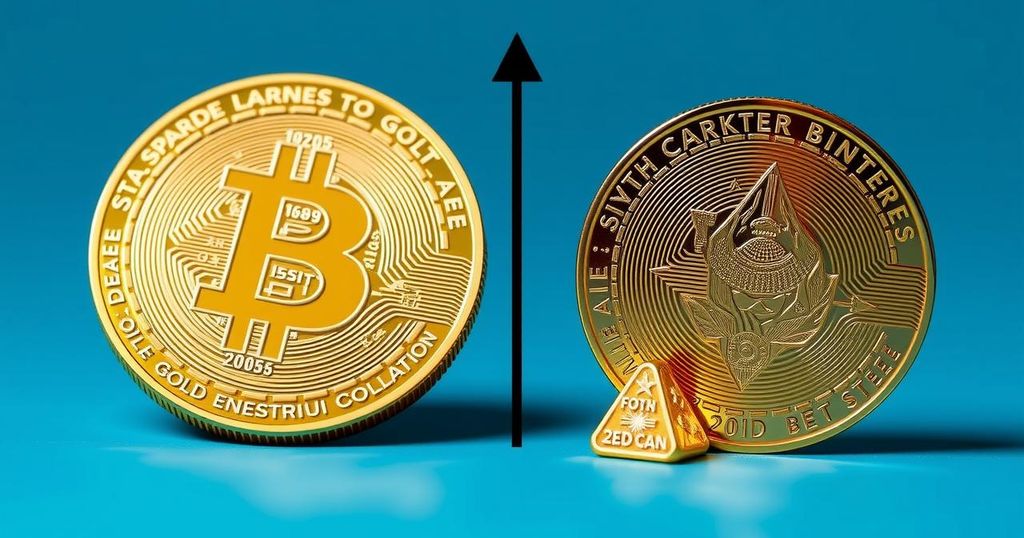Comparing Bitcoin and Gold: Investment Prospects for 2025
The debate between investing in 1-ounce gold bars versus Bitcoin intensifies as investors weigh stability against growth potential for 2025. Gold offers a reliable safe haven amid economic uncertainty, while Bitcoin presents high growth potential but also considerable volatility. The choice depends on individual risk tolerance and investment goals, suggesting that a diversified approach may be beneficial for many investors.
In light of the ongoing shifts in the financial landscape and persistent global economic uncertainties, investors are increasingly confronted with the dilemma of choosing between traditional assets, such as gold, and digital assets, such as Bitcoin. Gold has historically served as a stable store of value amidst market turbulence, while Bitcoin, having recently surpassed $100,000, presents itself as a volatile yet potentially lucrative investment. As we approach 2025, a critical evaluation of both options is imperative.
Gold is often regarded as a safe haven, particularly when geopolitical tensions and economic downturns loom. Its status as a finite resource secures its longstanding intrinsic value, a characteristic that can offer investors peace of mind in uncertain times. Additionally, gold has a proven ability to serve as a hedge against inflation, consistently maintaining purchasing power as living costs rise. Moreover, gold’s low volatility enhances its appeal for conservative investors who may be wary of drastic market fluctuations.
Contrarily, Bitcoin represents a new frontier in investment opportunities, driven by its high growth potential and increasing acceptance in mainstream finance. Its decentralized nature adds a layer of attractiveness for those skeptical of traditional financial systems. Institutional interest in Bitcoin continues to grow, with major financial players beginning to explore Bitcoin exchange-traded funds (ETFs), further legitimizing its position in the investment community.
Despite these advantages, both gold and Bitcoin present their own respective risks. Gold, while stable, generally offers modest growth, suitable primarily for wealth preservation rather than wealth generation. On the other hand, Bitcoin is characterized by high volatility and susceptibility to market sentiment and regulatory scrutiny, which can lead to substantial financial losses. Furthermore, its lack of physical tangibility introduces unique risks, particularly concerning cybersecurity.
Ultimately, the decision regarding which asset—gold or Bitcoin—represents the superior investment in 2025 will depend on individual risk tolerance, financial objectives, and market outlook. A balanced investment portfolio may benefit from the inclusion of both gold and Bitcoin, enabling investors to hedge against volatility while positioning themselves for potential growth. Comprehensive research and strategic planning remain essential when considering these investment options.
As global financial markets evolve, investors face complex decisions regarding asset allocation. Gold has served as a traditional store of value for centuries, offering security during economic downturns. Conversely, Bitcoin has emerged over the past decade as a pioneering digital asset, appealing to tech-forward individuals looking for substantial returns. The juxtaposition of these two investment types highlights the contrasts between established reliability and emerging opportunities, making the analysis of their prospective performances in 2025 especially relevant.
In conclusion, the choice between investing in 1-ounce gold bars or Bitcoin is a nuanced decision influenced by an investor’s specific circumstances and market conditions. Gold stands as a time-tested asset offering stability and predictable returns, while Bitcoin offers high-risk, high-reward potential that may appeal to those comfortable with market volatility. A diversified portfolio incorporating both assets is advisable, as it may enable investors to leverage the benefits of each option while mitigating inherent risks.
Original Source: www.cbsnews.com








Post Comment